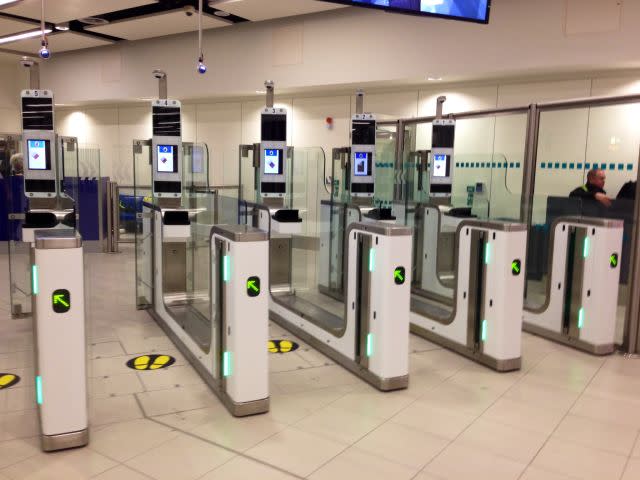Biometrics to Ease Security Intense in EU

Biometrics can be broadly defined as the use of personal traits to identify, or verify the claimed identity of individual. Fingerprint, iris, face, and voice are all examples of characteristics that have been used to identify us in this way. A biometric-based border control system includes (1) biometric passport & travel documents which contain traveler's biometric data to track and manage their flow; (2) nation-wide biometric database integrated in the entry-exit systems. Passport owner's information will be kept in an electronic chip, every time he goes through the border check, this information will be compared with the passport holder to identify if they are the same person. The system is considered more secure, quicker and more accurate than the paper passport since it uses biometric and contactless smartcard technology which is hardly counterfeited and tamper resistant.
In 2004, following the tragic events of 11 September 2001, the European Council has first introduced biometric recognition technology in passport and travel documents in order to enhance the security, combat fraud and falsification more effectively. Since then, many EU national governments such as Netherlands, France, the UK, Germany, etc. have already begun the use of biometric modalities for automated border crossing systems at selected airports as a risk-management tool with potential for improving security and facilitation to participating travelers. According to Frontex, traveler usage of the Automated Border Control (ABC) system in Portugal has been growing rapidly with an estimated 1.4 million users in 2013 (growth from 1 million in 2012). Also in Finland, there are 33 eGates in total as of 2013. The system not only brings the security benefit but also enhances the overall traveler experience by providing faster processing times. Simplified and fast checks will be cost–effective, more predictable, convenient and user friendly.
Recently at the end of 2015, due to the terrorist attack which massacred 130 people in Paris, EU national security concern is getting intensive than ever, especially in Schengen area where people are allowed move freely between states without being subjected to passport checks. According to the media, one of the terrorists impersonated as a Syria refugee and entered Greece in October. From there, he moved to many countries and eventually made his way to Paris for the attacks. Many Schengen border countries such as Greece has failed to control & register the major immigration influx and let them in through their border control. This has led to a constant threat of IS member to start the attack in the region.
In such situation, many biometric solutions have been brought up as an effective way to strengthen the border control security for all asylum seekers, including implementing biometric registration and identification. Sweden Prime Minister has proposed to implement biometric passport controls at the external borders of Europe's passport-free Schengen zone in order to maintain the principle of free movement within the Schengen area in the absence of internal border controls. On the other hand, France has called for EU-wide rules requiring all travelers to provide biometric data for border checks as they enter the Schengen area. As Euobserver explained, smart borders which was proposed by the European Commission in 2013, was temporarily shelved following concerns over its billion-euro price tag and law enforcement access, and now has been the subject of a public consultation. Furthermore, Turkey is preparing to issue biometric passports to its citizens as part of an agreement with the European Union to help them manage a major influx of refugees.
No matter how biometrics technology may be applied in the ABC systems, it will surely bring positive impact and benefits to the border control process. The system will automatically verify the validity of the travel document and then authorize the document's rightful holder to cross the border. It will also detect signs of falsification or counterfeiting. A biometric check provides enhanced confidence about the authenticity of the travel document. In the future, ABC systems will potentially have a critical impact on airport infrastructure and help ease the current security intense in EU.
